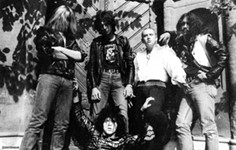To Your Health
My sister, who is schizophrenic but doing better on medication, is beginning to exhibit some odd behaviors. It started with her blinking a lot, and now she arches her eyebrows, makes chewing motions, and grimaces for no reason. Is this part of her mental problem?
By James Heffley, Ph.D., Fri., Nov. 30, 2001
A. Your sister is almost certainly suffering from "tardive dyskinesia" as a side effect of her medication. About 15% of those taking long-term medications for mental disorders will develop this difficulty. The malady was very rare until after the 1950s, when the popular treatment for mental illness changed from confinement to use of what are called "neuroleptic drugs." These drugs are capable of altering cognitive function and often make a big difference in the behavior of disturbed patients, so psychiatrists are loath to give them up in spite of this side effect. Since it usually takes three-10 years of using one of these medications before tardive dyskinesia appears, it was 1973 before the problem was definitely associated with drug treatment.
Tardive dyskinesia (tardive for late or tardy, dyskinesia for uncontrollable or abnormal movements) is a potentially permanent neurological disorder with involuntary movements that usually develop after some years of taking antipsychotic drugs. Repetitive grunting or humming sounds are also observed in some people. With continued use, the unwanted movements may expand to include hand wringing and leg kicking. At its worst the victim is continually writhing. Leaving off the medication may or may not bring improvement.
Nutritional supplements may help. The best researched is supplementation of vitamin E at 800 IU per day. Vitamin E is an excellent antioxidant, working especially in the fatty parts of the body such as the brain, and it may be this protective antioxidant effect of vitamin E that reduces the tendency to develop tardive dyskinesia.
Vitamin B-6 may benefit patients with tardive dyskinesia. In a double-blind crossover study (the most convincing kind of research), 15 patients with schizophrenia evaluated the treatment of tardive dyskinesia with four weeks of vitamin B-6 supplements. The abnormal movement scores were significantly better beginning in the third week of treatment with vitamin B-6 compared to the placebo period. The authors concluded, "vitamin B-6 appears to be effective in reducing symptoms of tardive dyskinesia."
Clinical experience encompasses several other potential helpers. In the 1960s at the North Nassau Mental Health Center in New York, schizophrenics were treated with the usual prescription medications plus very large doses of vitamin C, vitamin E, manganese, and B-Complex vitamins. There were no cases of tardive dyskinesia found over a 10-year time period. In the office of another health care professional that used vitamin/mineral supplements along with conventional medication for schizophrenia, very few cases of tardive dyskinesia were noted in a 28-year career. Over the past few years, several other nutrients have been proposed as likely prospects, including evening primrose oil (a source of gamma linolenic acid), choline, L-phenylalanine, and the branch-chain amino acids (L-leucine, L-isoleucine, and L-valine).
Although the newer antipsychotic medications are less likely to induce tardive dyskinesia, some risk remains and that risk could be substantially reduced or even eliminated by the addition of certain vitamins and minerals to the present protocol. There is a general trend toward combining conventional medications with nutrients. This "complementary medical" approach is winning converts among physicians and in the future will certainly benefit many patients.






